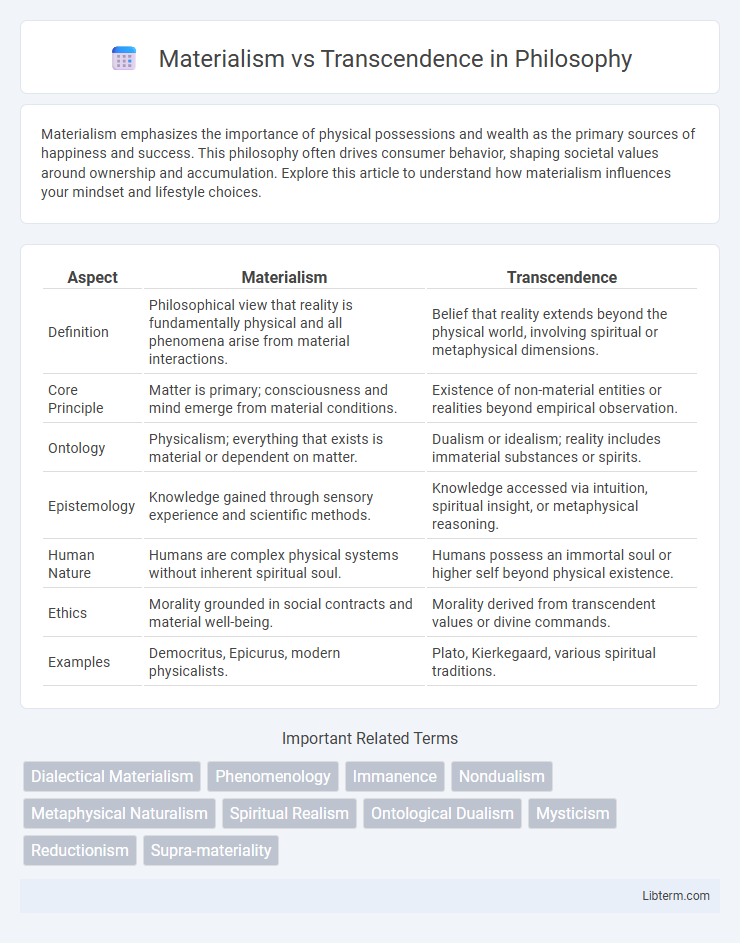Materialism emphasizes the importance of physical possessions and wealth as the primary sources of happiness and success. This philosophy often drives consumer behavior, shaping societal values around ownership and accumulation. Explore this article to understand how materialism influences your mindset and lifestyle choices.
Table of Comparison
| Aspect | Materialism | Transcendence |
|---|---|---|
| Definition | Philosophical view that reality is fundamentally physical and all phenomena arise from material interactions. | Belief that reality extends beyond the physical world, involving spiritual or metaphysical dimensions. |
| Core Principle | Matter is primary; consciousness and mind emerge from material conditions. | Existence of non-material entities or realities beyond empirical observation. |
| Ontology | Physicalism; everything that exists is material or dependent on matter. | Dualism or idealism; reality includes immaterial substances or spirits. |
| Epistemology | Knowledge gained through sensory experience and scientific methods. | Knowledge accessed via intuition, spiritual insight, or metaphysical reasoning. |
| Human Nature | Humans are complex physical systems without inherent spiritual soul. | Humans possess an immortal soul or higher self beyond physical existence. |
| Ethics | Morality grounded in social contracts and material well-being. | Morality derived from transcendent values or divine commands. |
| Examples | Democritus, Epicurus, modern physicalists. | Plato, Kierkegaard, various spiritual traditions. |
Understanding Materialism: Core Principles
Materialism centers on the belief that physical matter is the fundamental substance in nature, asserting that all phenomena, including consciousness, arise from material interactions. Core principles emphasize empirical evidence and scientific methods as the basis for understanding reality, rejecting supernatural or metaphysical explanations. This worldview prioritizes observable, tangible experiences and phenomena, often aligning with naturalism and physicalism in philosophical discourse.
Defining Transcendence: Beyond the Physical Realm
Transcendence refers to experiences, realities, or states of being that surpass the physical and material world, emphasizing spiritual, metaphysical, or existential dimensions beyond sensory perception. Unlike materialism, which asserts that only physical matter and measurable phenomena constitute reality, transcendence explores concepts such as consciousness, divine existence, and the soul, positing dimensions inaccessible to scientific measurement. Philosophers like Immanuel Kant and mystics throughout history have articulated transcendence as a fundamental principle that challenges the limits of human understanding rooted solely in empirical evidence.
Historical Perspectives on Materialism and Transcendence
Historical perspectives on materialism emphasize the primacy of physical substance and sensory experience, as seen in ancient Greek atomism and Enlightenment-era empiricism. Transcendence has been explored through religious and philosophical traditions, such as Platonism and Kantian metaphysics, highlighting realities beyond the material world. These contrasting views have profoundly influenced the development of Western metaphysical thought and cultural narratives.
Philosophical Arguments: Material vs. Transcendent Realities
Materialism asserts that all phenomena, including consciousness, derive from physical matter and its interactions, emphasizing empirical evidence and sensory experience as the basis for knowledge. Transcendence argues for the existence of realities beyond the material world, positing immaterial entities such as the soul, abstract forms, or spiritual dimensions that cannot be explained solely by physical laws. Philosophical debate centers on whether ultimate reality is confined to observable matter or extends into non-empirical realms, challenging the limits of scientific reductionism and metaphysical inquiry.
Materialism in Modern Society
Materialism in modern society drives consumer culture, emphasizing the acquisition of goods as a primary source of happiness and social status. Economic growth metrics often prioritize material wealth, leading to increased production and consumption patterns that impact environmental sustainability. Psychological studies link materialistic values to lower well-being and higher levels of anxiety and depression among individuals.
The Role of Spirituality in Transcendence
Spirituality plays a crucial role in transcendence by facilitating a connection beyond the physical realm, enabling individuals to experience higher states of consciousness and meaning. It fosters inner growth, purpose, and well-being that contrast with materialism's focus on tangible possessions. Practices like meditation, prayer, and mindfulness serve as pathways to spiritual transcendence and self-realization.
Psychological Impacts: Materialism vs. Transcendence
Materialism often leads to increased anxiety and lower life satisfaction due to its emphasis on external possessions and social comparison. Transcendence, characterized by pursuing meaning beyond material wealth, promotes psychological well-being, enhanced resilience, and greater emotional stability. Research in psychology highlights that individuals practicing transcendental values report reduced stress levels and improved mental health outcomes compared to materialistic counterparts.
Balancing Material Desires and Transcendent Goals
Balancing material desires and transcendent goals involves recognizing the impermanence of physical wealth while cultivating meaningful, spiritual pursuits that foster lasting fulfillment. Integrating mindful consumption with practices like meditation and altruism helps harmonize earthly satisfaction and higher purpose, reducing attachment to materialism. This equilibrium supports holistic well-being by aligning personal values with universal principles of growth and transcendence.
Cultural Interpretations of Materialism and Transcendence
Cultural interpretations of materialism and transcendence vary significantly, with Western societies often associating materialism with consumerism and individual success, while Eastern philosophies emphasize transcendence through spiritual growth and self-realization. Indigenous cultures frequently integrate materialism and transcendence by valuing natural resources alongside metaphysical beliefs that connect individuals to ancestral spirits and environmental stewardship. These diverse perspectives illustrate the complex relationship between physical possessions and spiritual values across global cultural frameworks.
Seeking Fulfillment: Which Path Leads to True Happiness?
Materialism emphasizes external possessions and sensory pleasures as sources of fulfillment, often leading to temporary satisfaction but long-term emptiness. Transcendence involves seeking meaning beyond physical experiences through spirituality, self-awareness, and connection with higher values, fostering deeper and lasting happiness. Studies in positive psychology reveal that individuals prioritizing transcendental goals report greater life satisfaction and emotional well-being compared to materialistic pursuits.
Materialism Infographic

 libterm.com
libterm.com